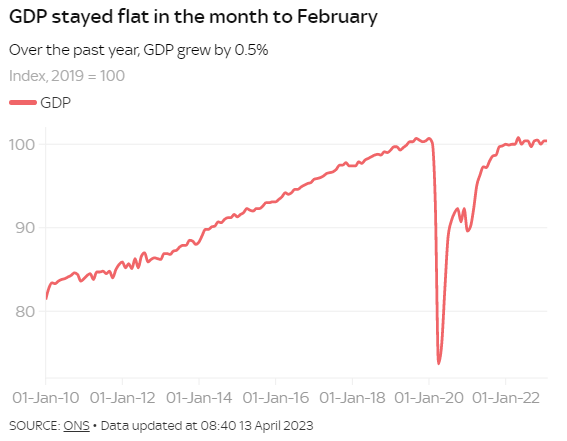The lack of growth was unexpected – 0.1% had been forecast.
Civil service strikes and low energy consumption offset growth in areas such as construction – which grew 2.4%, the Office for National Statistics (ONS) data showed.
The flatlining was unexpected. Economists polled by the Reuters news agency had forecast slight growth of 0.1% for the month.
ONS figures showed services production fell by 0.1% in the month, following growth of 0.7% in January 2023.
The largest contributor to negative growth in the services industry was education, which fell 1.7% in a month where teacher strikes took place.
Another strikes hit sector, public administration, was the second largest contributor to negative growth in the services industry.
WHAT IS GDP AND WHY DOES IT MATTER?
GDP stands for gross domestic product and measures the sum total of everything produced in the economy.
Politicians talk a lot about economic growth.
Former chancellor Kwasi Kwarteng targeted medium term growth of 2.5% in his September mini-budget and economic growth is the second priority in the prime minister’s five key pledges to the public for 2023.
Higher economic growth brings increased tax revenues into the Treasury – and likely higher incomes and standards of living.
As part of his focus on economic growth, Rishi Sunak says growing the economy will create better-paid jobs and opportunities across the country.
But a side-effect of growing GDP can also be rising greenhouse gas emissions.
The IPCC (Intergovernmental Panel on Climate Change) said that GDP and population growth “remained the strongest drivers of CO2 emissions from fossil fuel combustion in the last decade”.
Construction grew thanks to repair works taking place and retail output increased as many shops had a “buoyant month”, the ONS’s director of economic statistics, Darren Morgan said.
Unseasonably mild and dry weather led to reduced production of electricity and gas, Mr Morgan added. Output in the arts, entertainment and recreation industries grew, however.
It followed growth of 0.4% in January and confirmation the UK economy avoided recession in the second half of 2022 and actually grew 0.1% in the final three months of the year.
The most recent projections from the independent economic forecaster, the Office for Budget Responsibility (OBR), said the UK will avoid recession – defined as two consecutive quarters of negative growth – in 2023, despite previous predictions.
But the economy will still shrink overall this year by an expected 0.2%, and the fiscal watchdog warned living standards are to fall by the largest amount since records began.
Reference: https://news.sky.com/story/uk-economy-flatlines-with-no-growth-in-february-as-strikes-hit-productivity-12855748


